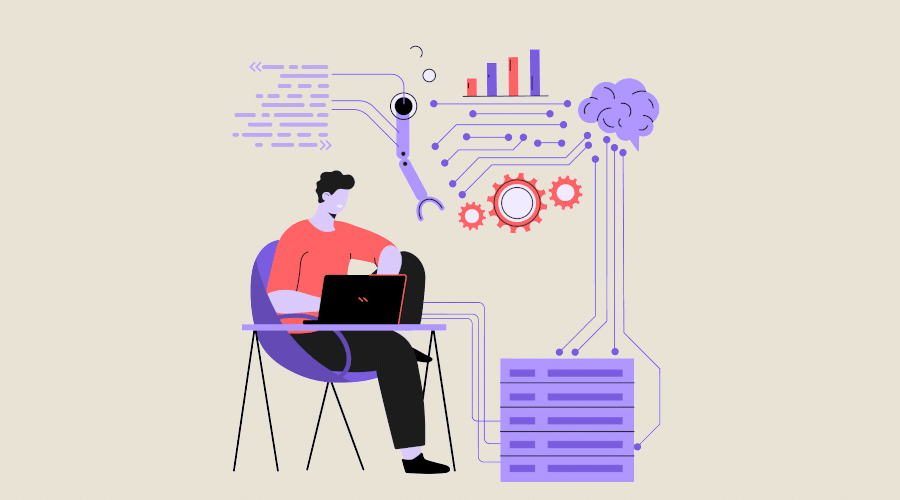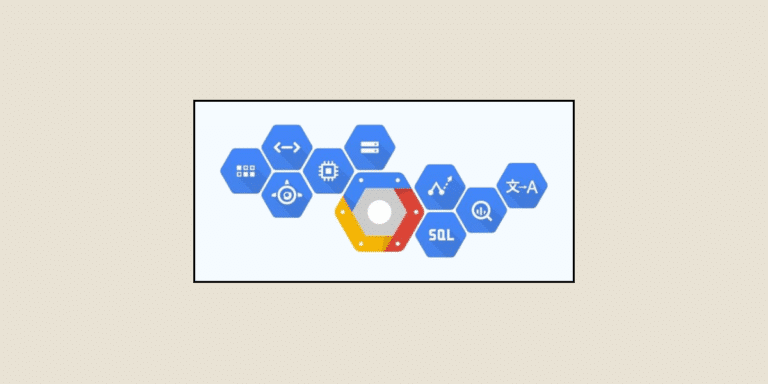By making it easier to scale up and access IT resources remotely, cloud computing is becoming increasingly popular. Its key players include Amazon Web Service (AWS), Microsoft Azure and Google Cloud Platform (GCP). In this article, we take a closer look at the latter solution.
What is Google Cloud Platform?
GCP is a complete cloud computing service that enables businesses to access all their tools from a simple web interface.
This means that organisations can work from any device anywhere in the world.
Above all, Google Cloud Platform offers its users an à la carte service. This means that organisations can choose just the resources they need to design an infrastructure tailored to their business and their objectives (this could be IaaS, PaaS or SaaS).
All they have to do is create a project and use all the resources they need to develop it.
What services does GCP offer?
GCP provides over 150 services to businesses and developers to help them work more efficiently. While it’s difficult to summarise them all in a single article, here are the main categories of these services.
The calculation
To virtualise your applications, you can use virtual machines or containers. In both cases, GCP has a solution:
Compute engine lets you create and run customisable VM instances.
Google Kubernetes Engine (GKE) or Cloud Run makes it easy to manage containers automatically.
Storage
Google Cloud Storage is the service of choice for data storage. Regardless of the type of data or its volume. What’s more, it makes it easy to organise resources according to projects, buckets, objects and so on.
And to transfer data between the various tools in the technology stack, you can use Transfer Appliance. As well as facilitating online transfers, it also works offline.
Networking
For efficient and secure networking, GCP offers several services, such as :
- Cloud Amor to protect applications and websites from hacker attacks;
- IAM to manage access rights to the various Google Cloud Platform resources;
- Cloud CDN to deliver content securely over the web. All of this, rapidly and scalably;
- Hybrid connectivity options for perfectly reconciling private and public virtual clouds.
Artificial intelligence and Machine Learning
Several GCP technologies enable organisations to create generative AI applications. In particular, the Machine Learning platform (Vertex AI) enables AI models to be trained to optimise their effectiveness.
You can also use AI tools directly, such as virtual agents or Speech to Text.

Databases
GCP integrates 3 fully managed databases: MySQL, PostgreSQL and SQL Server. Serverless and scalable, these databases enable organisations to build high-quality, robust and reliable applications.
And best of all, with Database Migration service, businesses can easily migrate their data to the cloud.
Data analysis
Big Query is one of GCP’s key services for data analysis. This solution handles the collection, processing and analysis of data streams in real time.
It is also possible to complement this solution with Looker to gain a clearer view of the organisation’s data. And so improve their performance.
Tools for developers
Cloud Code is the essential tool for all DevOps users for writing, debugging and executing cloud-native applications, both in the cloud and locally.
Then there’s Cloud Build, for creating, integrating, testing and deploying applications seamlessly across different environments. No matter what programming language you use.
What are the advantages of GCP?
If Google Cloud Platform is one of the key players in cloud computing today, it is because of all the benefits it offers its users:
- Billing: GCP services are based on pay-as-you-go billing. In other words, you only pay for what you use. And that’s by the minute (or even by the second).
- Services: with over 150 services, GCP is an ultra-complete solution that lets you develop an infrastructure from A to Z.
- An intuitive platform: with its customisable dashboard and numerous visualisation tools, GCP is regarded as one of the most intuitive and dev-friendly interfaces.
- Flexibility: this is the advantage of all cloud providers. The idea is to adapt the capacity of the service according to requirements.
- With Google Cloud Platform, the autoscaling features enable capacity to be increased or decreased as a function of traffic.
How can I learn more about Google Cloud Platform?
GCP is one of the leading cloud providers, so it’s vital that you get the training you need. To do this, you can take GCP certifications. But you can also develop your knowledge of cloud computing through business-oriented training courses.
At DataScientest, you’ll learn to master all the tools used by a DevOps, a Data Analyst, a Data Engineer, etc. Come and join us!











